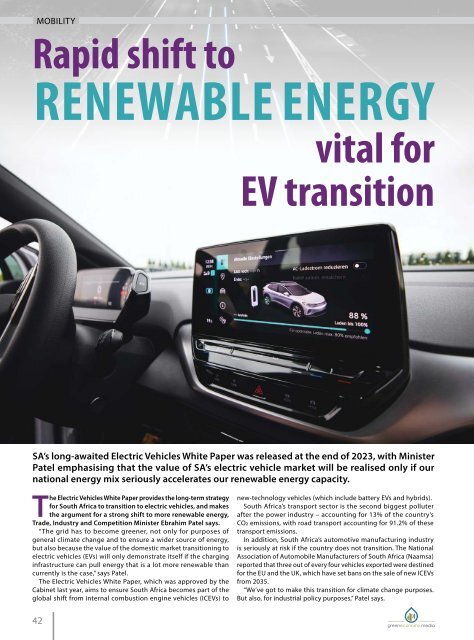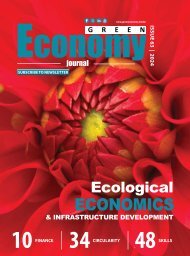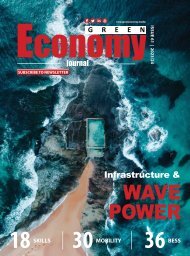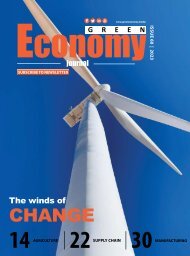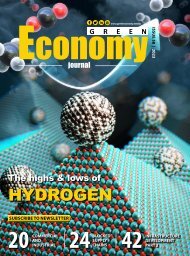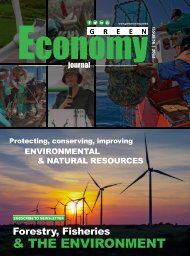Green Economy Journal Issue 62
You also want an ePaper? Increase the reach of your titles
YUMPU automatically turns print PDFs into web optimized ePapers that Google loves.
MOBILITY<br />
MOBILITY<br />
Rapid shift to<br />
RENEWABLE ENERGY<br />
vital for<br />
EV transition<br />
“This has been a successful contributor to South Africa’s GDP and<br />
manufacturing output and employment, and we want it to have a<br />
sustainable future in South Africa.”<br />
How would South Africa transition to EVs when it can barely<br />
keep the lights on?<br />
Patel says that the pace of South Africa’s transport transition would<br />
be influenced by several factors, including the fact that the country<br />
was battling with an energy shortage (he adds that South Africa<br />
would need to “avoid a sharp rise in energy demand on the grid from<br />
electric vehicles while the grid capacity is being rebuilt”), its energy<br />
mix was dominated by coal (which means charging an EV wouldn’t<br />
be as green as it is in other countries), and it was still in the early<br />
stages of rolling out charging infrastructure. As a result, the Electric<br />
Vehicles White Paper argues that the transition to EVs is dependent<br />
on the national energy mix shifting to renewable energy.<br />
“If our grid remains coal-based, the climate change value to<br />
domestic consumers will be lower,” Patel adds. “So, we are backing<br />
a green dash to try to get greater levels of renewable energy on the<br />
national grid.”<br />
PHASE 1. BUILDING PRODUCTION CAPABILITY<br />
South Africa doesn’t manufacture EVs locally – this not only means<br />
buying one in South Africa would be expensive (as it would be<br />
imported), but the local automotive manufacturing industry (which<br />
serves some 500 000 jobs) is seriously at risk – 66% of South Africa’s<br />
light vehicle production is exported overseas, with most of those<br />
cars going to countries that are planning on banning ICEVs soon.<br />
The first phase of the White Paper focuses on building production<br />
capability for electric vehicles.<br />
“We don’t want to be relegated to being only an ICEV producer,”<br />
Patel says, warning that if the transition to EVs was poorly managed,<br />
South Africa would have to import EVs, and because it is reliant on<br />
exports, by 2030 South Africa would have a declining asset base.<br />
The transition to EVs is<br />
dependent on the national<br />
energy mix shifting to<br />
renewable energy.<br />
SA’s long-awaited Electric Vehicles White Paper was released at the end of 2023, with Minister<br />
Patel emphasising that the value of SA’s electric vehicle market will be realised only if our<br />
national energy mix seriously accelerates our renewable energy capacity.<br />
The Electric Vehicles White Paper provides the long-term strategy<br />
for South Africa to transition to electric vehicles, and makes<br />
the argument for a strong shift to more renewable energy,<br />
Trade, Industry and Competition Minister Ebrahim Patel says.<br />
“The grid has to become greener, not only for purposes of<br />
general climate change and to ensure a wider source of energy,<br />
but also because the value of the domestic market transitioning to<br />
electric vehicles (EVs) will only demonstrate itself if the charging<br />
infrastructure can pull energy that is a lot more renewable than<br />
currently is the case,” says Patel.<br />
The Electric Vehicles White Paper, which was approved by the<br />
Cabinet last year, aims to ensure South Africa becomes part of the<br />
global shift from internal combustion engine vehicles (ICEVs) to<br />
new-technology vehicles (which include battery EVs and hybrids).<br />
South Africa’s transport sector is the second biggest polluter<br />
after the power industry – accounting for 13% of the country’s<br />
CO2 emissions, with road transport accounting for 91.2% of these<br />
transport emissions.<br />
In addition, South Africa’s automotive manufacturing industry<br />
is seriously at risk if the country does not transition. The National<br />
Association of Automobile Manufacturers of South Africa (Naamsa)<br />
reported that three out of every four vehicles exported were destined<br />
for the EU and the UK, which have set bans on the sale of new ICEVs<br />
from 2035.<br />
“We’ve got to make this transition for climate change purposes.<br />
But also, for industrial policy purposes,” Patel says.<br />
Article courtesy Daily Maverick<br />
Does the grid have the capacity to support EVs?<br />
MJ Booysen, an engineering professor at Stellenbosch University<br />
whose research and projects focus on electrifying the transport<br />
sector, says, “The answer is … it’s a negative number.”<br />
However, there are private companies that provide off-the-grid<br />
charging stations.<br />
As of mid-2023, South Africa had about 350 public EV charging<br />
stations, and many companies plan to expand.<br />
Patel says that while off-the-grid charging is part of the solution<br />
and should be encouraged, “We see it still being useful for early<br />
adopters and at a modest scale. If you want to move significantly,<br />
you’re going to have to integrate it into a stable infrastructure that<br />
can take a high load factor.”<br />
Patel emphasises that this meant dealing with grid constraints, and<br />
while this White Paper is not South Africa’s Integrated Resource Plan<br />
(which lays out the future of the country’s energy mix), it “makes the<br />
argument for a strong shift to more renewable energy”.<br />
Mike Mabasa, the CEO of Naamsa, said many original equipment<br />
manufacturers were looking at technology that recharged the battery<br />
as the vehicle moved. Some EVs have replaceable batteries, “So you<br />
drive into a charging station and instead of waiting for two hours to<br />
have the battery charged, you have it swapped for another.”<br />
PHASE 2. STIMULATING DEMAND FOR EVS<br />
Mabasa says, “We are very pleased to note that the White Paper<br />
takes into account stimulation for demand in Phase 2 … because<br />
we recognise the fact that the government is managing a number<br />
of competing – both social and also economic – challenges.”<br />
South Africa has only about 2 300 EVs among some two-million<br />
passenger vehicles, which is a far cry from the rest of the world, with<br />
14% of all cars sold worldwide in 2022 (amounting to 10-million)<br />
being electric.<br />
42<br />
43


